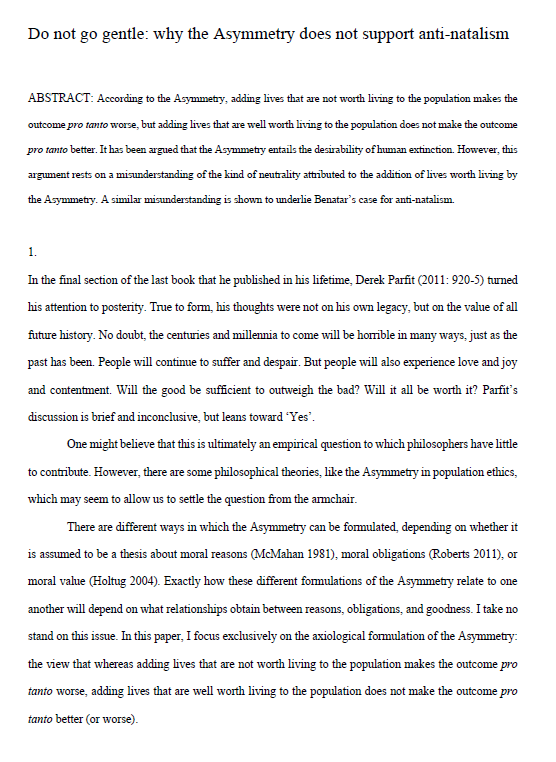Do not go gentle: why the Asymmetry does not support anti-natalism
Andreas Mogensen (Global Priorities Institute, Oxford University)
GPI Working Paper No. 3-2021
According to the Asymmetry, adding lives that are not worth living to the population makes the outcome pro tanto worse, but adding lives that are well worth living to the population does not make the outcome pro tanto better. It has been argued that the Asymmetry entails the desirability of human extinction. However, this argument rests on a misunderstanding of the kind of neutrality attributed to the addition of lives worth living by the Asymmetry. A similar misunderstanding is shown to underlie Benatar’s case for anti-natalism.
Other working papers
Heuristics for clueless agents: how to get away with ignoring what matters most in ordinary decision-making – David Thorstad and Andreas Mogensen (Global Priorities Institute, Oxford University)
Even our most mundane decisions have the potential to significantly impact the long-term future, but we are often clueless about what this impact may be. In this paper, we aim to characterize and solve two problems raised by recent discussions of cluelessness, which we term the Problems of Decision Paralysis and the Problem of Decision-Making Demandingness. After reviewing and rejecting existing solutions to both problems, we argue that the way forward is to be found in the distinction between procedural and substantive rationality…
Ethical Consumerism – Philip Trammell (Global Priorities Institute and Department of Economics, University of Oxford)
I study a static production economy in which consumers have not only preferences over their own consumption but also external, or “ethical”, preferences over the supply of each good. Though existing work on the implications of external preferences assumes price-taking, I show that ethical consumers generically prefer not to act even approximately as price-takers. I therefore introduce a near-Nash equilibrium concept that generalizes the near-Nash equilibria found in literature on strategic foundations of general equilibrium…
Existential risks from a Thomist Christian perspective – Stefan Riedener (University of Zurich)
Let’s say with Nick Bostrom that an ‘existential risk’ (or ‘x-risk’) is a risk that ‘threatens the premature extinction of Earth-originating intelligent life or the permanent and drastic destruction of its potential for desirable future development’ (2013, 15). There are a number of such risks: nuclear wars, developments in biotechnology or artificial intelligence, climate change, pandemics, supervolcanos, asteroids, and so on (see e.g. Bostrom and Ćirković 2008). …

